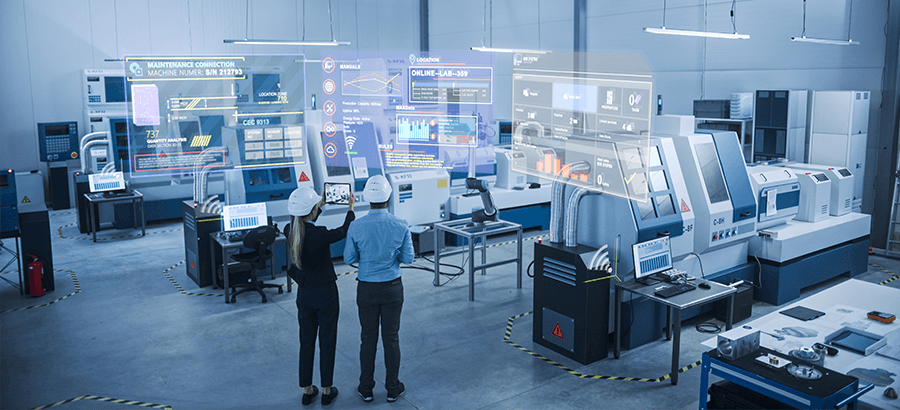AI for manufacturers
Using artificial intelligence (AI) in manufacturing can significantly improve productivity, reduce equipment failure, increase production efficiency and help identify new business opportunities.
The use and discussion of AI has become common. A 2023 survey by McKinsey reported that 79 percent of all respondents had at least some exposure to gen AI, either for work or outside of work. Despite this finding, the report also noted that organizations still limit the scope of AI use.
That indicates that manufacturers who adopt AI early could achieve a significant advantage over laggards. This blog discusses how manufacturers can start making AI a reality.
How does AI work?
AI refers to computing capabilities that represent intelligence, including image and video recognition, prescriptive modelling, smart automation, advanced simulation, and complex analytics. Before 2023, AI involved two technologies.
- Machine learning (ML): Uses algorithms and data to detect patterns without requiring explicit programming to do so automatically.
- Deep learning (DL): A subset of machine learning that uses neural networks to identify objects like images and videos.
ML and DL mainly analyze, classify, cluster, and rank data.
When ChatGPT was released in 2023, a new AI term was introduced — Generative AI (GenAI). GenAI systems are trained on massive amounts of text data to understand and generate human-like language.
In the context of manufacturing, GenAI will enable a new set of AI solutions
- Assistance applications: improve the efficiency of hands-on tasks such as programming or maintaining machines.
- Recommendation tools: help workers identify the best methods for tasks, e.g. creating maintenance instructions.
Smart manufacturing: the prerequisite for AI in manufacturing
Manufacturers are beginning to understand the role of technology in transforming business models. This the concept of Smart Manufacturing. The concept is a development of the Fourth Industrial Revolution, which is the integration of digital technologies into manufacturing processes that can communicate, analyze, and act upon information.
The smart factory is an environment, enabled by digital technologies including AI, to monitor and control the physical processes of the factory and provide data for decision-making.
How to make AI work
To succeed, AI in manufacturing requires three components to work together:
1. AI and Data
AI systems are data-driven, meaning they learn and improve from the information they are exposed to. The quality and quantity of data is crucial for the success of AI applications. Data is essential for AI to learn, improve, and perform tasks effectively.
ML models learn from data. The more data they process, the better they become at recognizing patterns, identifying trends, and making predictions. Data helps AI refine its understanding of the world.
Data quality and quantity of data directly affect how well AI performs. A model built on a million data points will be better than one built on a thousand.
2. AI and Processes
AI has the potential to significantly improve manufacturing processes. Typical processes where AI has shown value include:
- Quality control: AI models can be trained on data from production lines to identify patterns and deviations associated with product defects. By analyzing real-time data from sensors and cameras, quality issues can be detected early in the production process, reducing waste and improving product quality.
- Logistics and inventory management: AI solutions can analyze historical data on supply chain operations, including inventory levels, demand patterns, transportation costs, and supplier performance. This can help optimize inventory management, identify bottlenecks, and optimize logistics operations.
- Predictive maintenance: AI applications can analyze data from sensors and equipment to predict equipment failures before they occur and allow maintenance to be scheduled, thus reducing unnecessary downtime. This also improves asset reliability and lifetime.
- Finance: AI can identify anomalous financial transactions that may be due to fraud or human error.
- Process optimization: Manufacturers can use AI models to analyze sensor data and historical process data to optimize production processes and improve overall efficiency.
- Demand Forecasting: AI systems can analyze historical sales data, market trends, and external factors to generate accurate demand forecasts. This helps manufacturers optimize production planning, reduce inventory carrying costs, and improve customer satisfaction by ensuring product availability.
To start an AI project, select one process that will deliver significant business benefit. Then scale out to other processes.
3. AI and People
Manufacturers should be aware of how AI will affect the skills strategies they will need to create. People will need to learn to do more complex tasks which will change lives, including creating better jobs. Companies also need to plan how they should adapt the organization to use AI in a responsible and well-governed manner.
How ERP can make AI a Reality
With an ERP system, manufacturers will find they may already have a large amount of data to start an AI initiative. An ERP application with embedded AI capabilities can analyze customer specifications and orders and use it to suggest product configurations or new business opportunities.
By integrating AI with their ERP system, manufacturers can improve process efficiency and inventory management, reduce human errors or fraud in financial transactions, and leverage sensor and other machine data to forecast potential downtime due to equipment failure. An ERP application can ensure proper data integration and collection and provide the information in the right format for data scientists and engineers to make important decisions that impact the manufacturing chain.
With the right ERP backbone, manufacturers can look to create more intelligent manufacturing processes, optimizing the interaction between humans and machines to enable a connected factory.
The benefits of AI in manufacturing
In a survey by Deloitte, 86 percent of surveyed manufacturing executives believe that smart factory solutions enabled by AI will be the primary drivers of competitiveness in the next five years. GenAI is expected to unlock potential in areas such as product design, aftermarket services, and supply chain management, potentially reducing costs across manufacturing organizations.




6 thoughts on “AI in manufacturing”
Kevin, technology nicely explained as always. You make the point but not explicitly that AI and Data open up the world of Internet of Things (IoT) to automatically monitor a plethora of data normally missed by humans. Problem is the devices required to get hold of this environmental or non-system data can be expensive, more that humans but more reliable.
Also, like humans, the vintage of data and hence knowledge/experience from it ages and may lose relevance. Just like people AI must unlearn as well as learn. But at least it never retires.
All the best and thanks
DOUG
This SYSPRO blog on AI in manufacturing provides a thorough overview of how AI is revolutionizing the industry. It covers essential aspects such as the role of data, the integration of AI with manufacturing processes, and the importance of human adaptation to new technologies.
Telkom University nice website
Telkom University nice dude
Telkom University i like this website
Stay profitable even in volatile markets with Cryptorobotics bots! Automate your trading strategy and reduce risks. https://cryptorobotics.ai/